
Trump can’t decide if he had a ‘good’ or ‘sad’ day at 2020 election arraignment
Donald Trump couldn’t seem to decide whether he had a “good day” or a “sad day” as he was arrested and arraigned on four criminal charges over his attempts to overthrow the 2020 presidential election. The former president appeared in court in Washington DC on Thursday afternoon, where he pleaded not guilty to all charges in what now marks his third criminal case. Following the arraignment, he returned to his Bedminster estate and took to Truth Social where, he claimed – in a full-caps late-night rant – that he had a “very good day”. “CONSIDERING THE FACT THAT I HAD TO FLY TO A FILTHY, DIRTY, FALLING APART, & VERY UNSAFE WASHINGTON, D.C., TODAY, & THAT I WAS THEN ARRESTED BY MY POLITICAL OPPONENT, WHO IS LOSING BADLY TO ME IN THE POLLS, CROOKED JOE BIDEN, IT WAS A VERY GOOD DAY!” he wrote on Truth Social. However, this positive outlook appears to jar with the mood he displayed on the tarmac as he jetted out of DC on his private plane – not to mention the mood sources said he displayed behind the scenes. “This is a very sad day for America,” Mr Trump told reporters as he embarked Trump Force One to head back to his Bedminster club. “It was also very sad driving through Washington DC and seeing the filth and the decay and all of the broken buildings and walls and the graffiti. “This is not the place that I left. It’s a very sad thing to see it.” His comments on Washington DC’s apparent deterioration came after Mr Trump left the capital in January 2021 as it was reeling from the January 6 Capitol riots – an attack which came out of the false claims he spread of 2020 election fraud. Meanwhile, sources behind the scenes of Thursday’s hearing revealed a somewhat “dejected” mood. The former president was said to be “irked” that US District Judge Moxila Upadhyaya had referred to him as “Mr Trump” and not “Mr President” during his court appearance. “I’m learning tonight that Trump left here in a sour and dejected mood,” said CNN host Kaitlan Collins. “He was, quote, ‘pissed off,’ according to someone who spoke to him.” She added: “I am told that the former president, one thing that irked him particularly, was during that hearing today that lasted about 27 minutes, was when the magistrate judge referred to him as simply ‘Mr Trump.’” Mr Trump’s alleged annoyance comes as the staff at his Mar-a-Lago and Bedminster estates typically still refer to him as “President Trump” – despite leaving the White House over two years ago. “That may not sound odd to anyone else, but he is still referred to by his former title ‘President Trump’ when he’s at his Bedminster golf club in New Jersey, as he is tonight, or at Mar-a-Lago,” revealed Ms Collins. Instead of being waited on by his staff and called “Mr President”, Mr Trump was forced to endure a court appearance similar to that of many criminal defendants. He had to wait around 15 minutes for the judge to arrive and came face to face with prosecutors pursuing charges against him – at one point having something of a stare off with special counsel Jack Smith in the courtroom. However, in other ways his treatment was different – as he did not have his mugshot taken and was not placed in handcuffs. Mr Trump surrendered to authorities and was arrested on four federal charges of conspiracy to defraud the United States, conspiracy to obstruct an official proceeding, obstruction of and attempt to obstruct an official proceeding, and conspiracy against rights. He then appeared for his arraignment at the E Barrett Prettyman Federal Courthouse where he stared down special counsel Jack Smith before pleading not guilty to all charges. The former president is accused of conspiring with his allies to overturn the 2020 election, in a bid to sabotage the vote of the American people. A grand jury, which has spent months hearing evidence in special counsel Jack Smith’s investigation, returned a federal indictment on Tuesday hitting him with four federal charges. The Justice Department alleges that Mr Trump and his circle of co-conspirators knew that he had lost the election but launched a multi-prong conspiracy to do everything they could to enable him to cling to power. This included spreading “knowingly false claims of election fraud to get state legislators and election officials to subvert the legitimate election results and change electoral votes for the Defendant’s opponent, Joseph R. Biden, Jr., to electoral votes for the Defendant”, the indictment states. Mr Trump and his allies also allegedly plotted to send slates of fake electors to seven “targeted states” of Arizona, Georgia, Michigan, Nevada, New Mexico, Pennsylvania and Wisconsin which President Joe Biden had won – to get them to falsely certify the election for Mr Trump. The indictment also alleges Mr Trump tried to use the DOJ to “conduct sham election crime investigations”, sending letters to the seven states claiming that “significant concerns” had been found in the elections in those states. As well as the false claims about the election being stolen from Mr Trump, the scheme also involved pushing false claims that Vice President Mike Pence had the power to alter the results – and pushing Mr Pence to “fraudulently alter the election results”. When Mr Trump’s supporters stormed the US Capitol in a violent attack that ended with five deaths, Mr Trump and his co-conspirators “exploited” the incident by “redoubling efforts to levy false claims of election fraud and convince Members of Congress to further delay the certification based on those claims,” the indictment claims. At a press conference on Tuesday, Mr Smith placed the blame for the January 6 attack on the US Capitol firmly on Mr Trump’s shoulders. “The attack on our nation’s capitol on January 6, 2021, was an unprecedented assault on the seat of American democracy,” he said. “As described in the indictment, it was fueled by lies. Lies by the defendant targeted at obstructing a bedrock function of the US government – the nation’s process of collecting, counting and certifying the results of the presidential election.” The indictment marks Mr Trump’s second federal indictment, his third criminal indictment overall – and potentially his most serious. While the former president is the only person charged in the case, the indictment also refers to six co-conspirators who worked with him to try to overturn the 2020 presidential election. The six individuals – four attorneys, one Justice Department official and one political consultant – have not been named in the charging documents because they have not yet been charged with any crimes. However, based on the details in the indictment and records already known about the events leading up to the Capitol riot, the identities are apparent as Rudy Giuliani, Sidney Powell, John Eastman, Jeffrey Clark, Kenneth Chesebro and Boris Epshteyn. This marks Mr Trump’s third indictment after he was hit with New York state charges following an investigation into hush money payments made prior to the 2016 election and then separate federal charges over his alleged mishandling of classified documents on leaving office. He has pleaded not guilty in both of those charges as well. Read More Live updates: Trump pleads not guilty at arraignment in 2020 election case Meet Jack Smith: The special prosecutor who could take down Trump Trump appears to stumble over his name and age at arraignment Watch: Donald Trump’s motorcade blocked by herd of goats Chairman of UK Republican group wishes Donald Trump would not run for president Will Trump’s alleged co-conspirators in the Jan 6 indictment turn on him?
2023-08-04 21:26
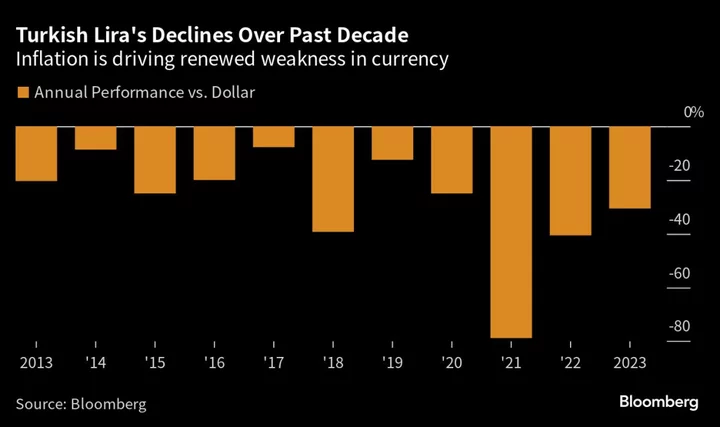
Deutsche, HSBC See Turkish Lira Diving to New Lows on Inflation
Turkey’s rebounding inflation is prompting bank economists to issue more pessimistic forecasts for the lira, already one of
2023-08-04 21:25
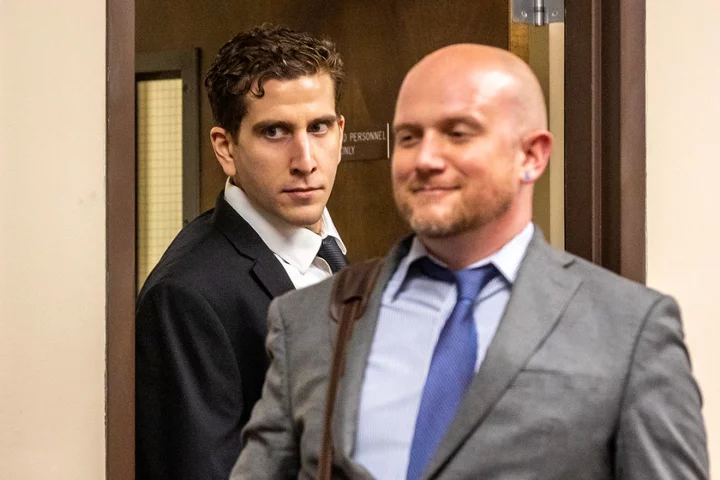
Bryan Kohberger finally reveals vague alibi for night of Idaho murders
Bryan Kohberger has finally offered up a vague alibi for his movements on the night that he is accused of brutally stabbing four University of Idaho students to death in their beds. The 28-year-old criminal justice PhD student claims that he was out on a solo drive throughout the night of 12 November and into the early hours of 13 November – but admits that there are no witnesses to back up his version of events. “Mr. Kohberger has long had a habit of going for drives alone. Often he would go for drives at night,” his attorney Anne Taylor wrote in a new court filing. “He did so late on November 12 and into November 13, 2022. Mr. Kohberger is not claiming to be at a specific location at a specific time; at this time there is not a specific witness to say precisely where Mr. Kohberger was at each moment of the hours between late night November 12, 2022 and early morning November 13, 2022. “He was out, driving during the late night and early morning hours of November 12-13, 2022.” The claims about Mr Kohberger’s unusual nighttime habits – and his whereabouts on the night of the murders – come after prosecutors demanded that his legal team reveal his alibi ahead of his October trial. Under Idaho law, defendants have 10 days to provide a written statement about where they claim to have been at the time of the alleged crime and offering information about any witnesses who can support their claim. On 23 May – one day after he was arraigned on four murder charges – Latah County Prosecutor’s Office put in a demand for Mr Kohberger’s notice of alibi. Back then, Mr Kohberger’s legal team asked Judge John Judge for an extension, saying that they needed more time due to the wealth of evidence in the high-profile case, and the deadline was extended to 24 July. But the deadline came and went, with Mr Kohberger’s legal team hinting that he has evidence placing him in another location at the time of the murders – but stopping short of revealing where and instead saying it may come to light at trial. The prosecution subsequently filed a motion seeking to compel an alibi. While Mr Kohberger’s attorney said that there is no specific witness to say where he was throughout the time of the murders, she wrote in the new filing that she anticipates “corroborating witnesses” will back up his explanation at trial. Mr Kohberger is facing the death penalty over the brutal 13 November murders of Madison Mogen, Kaylee Goncalves, Xana Kernodle and Ethan Chapin. He is due to stand trial on 2 October after being indicted by a grand jury on four counts of first-degree murder and one burglary charge. His explanation that he was out on a solo drive that night comes as prosecutors tied him to the murders, in part, through surveillance footage showing his white Hyundai Elantra travelling to and from the crime scene. The affidavit, released in January, outlined some of the evidence against the accused killer – including his DNA on a knife sheath left behind at the scene of the murders, the surveillance footage and cellphone activity. The sheath – for a military or Ka-Bar style knife – was found partly under Mogen’s body after she and Goncalves were found stabbed multiple times on Mogen’s bed on the third floor of the home. DNA on the button clasp of the sheath was then found to match that of the 28-year-old accused killer. Mr Kohberger’s attorneys have sought to cast doubts on the strength of this DNA evidence, in particular the use of genetic genealogy. According to the affidavit in the case, the FBI used genetic genealogy databases to try to identify the DNA source. Trash was then collected from the suspect’s parents’ home in the Poconos Mountains and a familial match – from Mr Kohberger’s father – was made to the sheath, according to the criminal affidavit. Following Mr Kohberger’s arrest on 30 December, DNA samples were then taken directly from the suspect and came back as “a statistical match”, say prosecutors. Mr Kohberger is accused of breaking into an off-campus student home on King Road in the early hours of 13 November and stabbing the four students to death with a large, military-style knife. Two other female roommates lived with the three women at the property and were home at the time of the massacre but survived. One of the survivors – Dylan Mortensen – came face to face with the masked killer, dressed in head-to-toe black and with bushy eyebrows, as he left the home in the aftermath of the murders, according to the criminal affidavit. For more than six weeks, the college town of Moscow was plunged into fear as the accused killer remained at large with no arrests made and no suspects named. Then, on 30 December, law enforcement suddenly swooped on Mr Kohberger’s family home in Albrightsville, Pennsylvania and arrested him for the quadruple murders. The motive remains unknown and it is still unclear what connection the WSU PhD student had to the University of Idaho students – if any – prior to the murders. The murder weapon – a fixed-blade knife – has still never been found. As a criminal justice PhD student at WSU, Mr Kohberger lived just 15 minutes from the victims over the Idaho-Washington border in Pullman. He had moved there from Pennsylvania and began his studies there that summer, having just completed his first semester before his arrest. Before this, he studied criminology at DeSales University – first as an undergraduate and then finishing his graduate studies in June 2022. While there, he studied under renowned forensic psychologist Katherine Ramsland who interviewed the BTK serial killer and co-wrote the book Confession of a Serial Killer: The Untold Story of Dennis Rader, the BTK Killer with him. He also carried out a research project “to understand how emotions and psychological traits influence decision-making when committing a crime”. Read More Bryan Kohberger claims DNA may have been planted at Idaho murders scene – as alibi deadline looms Bryan Kohberger defence hints at alibi in Idaho murders - but won’t reveal what it is as deadline passes Bryan Kohberger could face the firing squad for the Idaho murders. What would this mean?
2023-08-04 20:20

Lionel Messi’s Inter Miami Gets $75 Million Ares Investment
Ares Management is investing an extra $75 million in Inter Miami CF, the Major League Soccer club that’s
2023-08-04 20:19
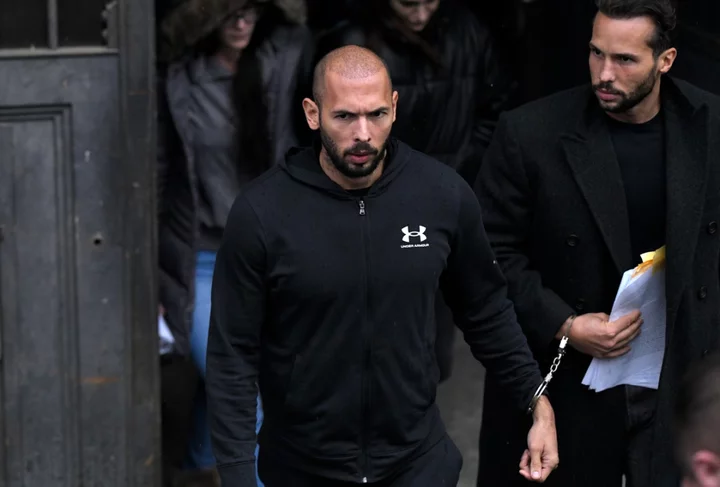
Andrew Tate: A timeline of his rise and fall
Andrew Tate, the controversial former kickboxing world champion turned social media influencer, has been released from house arrest in Romania after mounting a successful appeal as he awaits trial on human trafficking charges. The Bucharest Court of Appeals said in a written ruling that it would be replacing its earlier “house arrest measure with that of judicial control for a period of 60 days from August 4 until October 2”, a lighter restriction that will nevertheless require him to seek permission before leaving the municipality. The influencer, his brother Tristan Tate and two Romanian women were arrested in December 2022 and charged in June with rape, human trafficking and forming a criminal gang to sexually exploit women, with seven women alleged to have been targeted. The quartet deny the charges. Mr Tate has amassed millions of followers across Facebook, Instagram, Twitter, YouTube and TikTok over the past decade. But he has also seen his accounts banned over inflammatory statements he has made, often appearing to advocate violence against women, which the platforms ruled violated their policies. Frequently accused of embodying toxic masculinity and misogyny, having claimed that women cannot drive, belong in the home and are a man’s property, Mr Tate has made inconsistent statements on the subject. He told the Anything Goes with James English podcast in June 2021 that he was “absolutely sexist” and “absolutely a misogynist”, only to then claim on Piers Morgan Uncensored more recently that he was “absolutely not”. He has also claimed that his remarks, viewed by millions online, are made in the persona of a “comic character” and have been unfairly taken out of context. “I play an online character and am brash and bravado but my views are pure and simply say to find the highest value men and women you can with good hearts,” he told The Independent in response to criticism from the domestic violence organisation White Ribbon. Mr Tate has also made claims about the extent of his personal wealth and his online popularity that have not been substantiated. But he has found an eager audience online for his messages of male empowerment, with teachers increasingly coming forward to express concern about his potentially radicalising influence on impressionable teenage boys, fearing they could take the wrong lessons from pronouncements like the “41 Tenets” on his website. “I believe that men have the divine imperative to become as capable, powerful, and competent as possible in this life,” states the first. Here is a brief introduction to the life and times of Andrew Tate. 1986 Emory Andrew Tate III was born in Washington, DC, on 1 December to Emory Tate Jr, a sergeant of the US Air Force and a chess International Master, and his English wife Eileen, a catering assistant. Initially raising their children in Chicago, Illinois, the couple divorced in 1997, at which point Eileen Tate relocates to a council estate in Luton, Bedfordshire, with her young family, where she reportedly still lives. Tate has described his mother as “my hero” but says they were “broke as a joke” during his childhood. Of his father, he told The Times last September he would be away from home for extended periods while serving but would say to his son upon returning: “Look, your mother has to do the day-to-day stuff. I’m a man. I have to make sure you’re protected.” 2005 The young Andrew Tate starts boxing and martial arts training while reportedly also working as a TV producer. 2009 Earns his first kickboxing championship when he wins the British ISKA Full Contact Cruiserweight Championship in Derby, going by the name King Cobra. 2011 Wins his first ISKA world title by beating Jean-Luc Benoit via knockout. As his celebrity begins to grow, Tate joins Twitter, initially as @Cobratate. 2012 Tate and his brother Tristan begin their first adult webcam business employing lingerie-clad models to engage in chat sessions with men. In a later interview with The Mirror in March 2022, the brothers joke that their webcam ventures, which charge customers $4 (£3.30) an hour, are “a total scam” because the models featured often tell lonely male callers “fake sob stories” to elicit sympathy and earn larger tips. Tristan Tate tells the newspaper the brothers are protected by two lines in their terms and conditions: “One is broadcasting is ‘for entertainment purposes only’. That means if a model says she has a sick dog or a sick grandma it doesn’t have to be true. “The next is that all cash given to models is ‘a voluntary sign of gratitude for their time broadcasting’.” 2013 Wins his second ISKA world title in a 12-round match against Vincent Petitjean. 2016 Invited onto the 17th season of the reality TV show Big Brother, Tate quickly attracts scrutiny over his track record of controversial statements. He is removed from the house after just six days when a video surfaces showing him hitting a woman with a belt. In a statement, both he and the woman featured in the clip say they are friends and that the actions depicted were consensual. 2017 Moves to Bucharest, Romania, with Tristan, setting up home in a heavily-fortified suburban compound and claiming the UK has “gone downhill”. He said the prospect of avoiding rape charges more easily was “probably 40 per cent of the reason” for moving to Central Europe, adding: “I’m not a f***ing rapist, but I like the idea of just being able to do what I want. I like being free. “If you’re a man living in England or Germany or America or any of the Western world right now you’ve decided to live in a country where any woman … at any point in the future can destroy your life.” He later tells The Times this was intended as an attack on litigation culture, commenting: “A dying empire adopts laws like a sick man adopts medicine.” Having already stirred controversy on Twitter by claiming depression “isn’t real”, Tate is permanently suspended from the platform after saying on 18 October that women should “bear some responsibility” for being sexually assaulted, part of a thread commenting on the Harvey Weinstein affair. “I don’t agree with being banned, people get banned from Twitter all the time and make new profiles,” he said subsequently. “I’m not inciting violence, promoting terrorism or harassing anyone. This is censorship of free speech. I’ve never had specific tweets banned or been cautioned.” The controversy boosts his profile among far-right conservatives, bringing him into the company of Alex Jones, Paul Joseph Watson and Donald Trump Jr in America and Nigel Farage and Tommy Robinson in the UK August 2022 Having continued to build his following on social media and in right-wing media, a campaign to de-platform Tate resulted in his being banned from Facebook, Instagram, TikTok and YouTube. In a “final” video, Tate claims that many of the criticisms levied at him are based on clips that have been misrepresented. “I have some responsibility to bear. I still blame myself, because my rise has been so meteoric and I became so famous so quickly,” he said. “My responsibility is that any negative connotations in my videos are removed. The way you say things in a video that gets 500 views is very different from the way you say things in a video that gets 50 million views – the more people you reach, the more important it is that people don’t take things out of context. “If there was as many people cutting up videos like they did mine and those people had a negative agenda, they could make Mickey Mouse look evil, you could make anyone look bad.” His message is dismissed by Hope Not Hate’s research director, Joe Mulhall, who tells The Independent the clip attempts “to completely rewrite his behaviour, justify the unjustifiable, and … takes no responsibility”. That same month, financial services company Stripe pulls out of processing subscriptions for Hustler’s University, another Tate business billed as an online “academy” where members pay a monthly membership fee in exchange for advice on how to make a passive income from online industries such as cryptocurrency. The venture reportedly has around 100,000 paying subscribers who are charged around $49 (£40) per month but Stripe’s decision prompts it to shut its affiliate marketing programme, which had encouraged the spread of Tate videos across social networks. October 2022 After a video of Tate praying at a mosque in Dubai with MMA fighter Tam Khan goes viral, he announces he has converted to Islam in a post on Gettr. November 2022 Tate is reinstated on Twitter by new owner Elon Musk, along with other previously banned right-wing figures including Donald Trump, Kanye West and Jordan Peterson. 28 December 2022 Shortly after Christmas, Tate posts his now-infamous tweet to Swedish climate activist Greta Thunberg, boasting about his Bugatti and Ferraris and asking for her email address so he can “send a complete list of my car collection and their respective enormous emissions”. “Yes, please do enlighten me,” she responded. “Email me at smalldickenergy@getalife.com.” The internet duly erupts, prompting Tate to respond initially rather weakly by asking “How dare you?!”. He then returned with a video of himself sporting a dressing gown and smoking a cigar claiming to believe the joke has backfired on Thunberg and accusing the “global matrix” of deploying a “bot farm” to send her tweet viral. 29 December A day later, Tate and his brother are detained in Romania for 30 days, along with two women, on suspicion of human trafficking, rape and forming an organised crime group. Prosecutors say they have found six women who claim to have been sexually exploited by the suspects for the purpose of creating internet pornography. An investigation has reportedly been underway since April. 30 December As excitable social media rumours suggest that a Jerry’s Pizza box featured in Tate’s video inadvertently revealed his location to the authorities, Thunberg tweets about him again, declaring: “This is what happens when you don’t recycle your pizza boxes.” 3 January 2023 Tate’s valuable luxury car collection is seized by the Romanian authorities. 8 January One of the two Tate brothers is allegedly hospitalised after a medical check-up in jail, according to Antena 3, a CNN-partnered Romania news site. A cryptic tweet follows from Tate’s account, although it is unclear if he wrote it himself, which states: “The Matrix has attacked me. But they misunderstand, you cannot kill an idea. Hard to Kill.” 10 January Tate appears in court in Bucharest to appeal his detention, arriving wearing handcuffs and bearing a copy of the Quran. His lawyers insist there is “no evidence” against him but the judge rules against him. 31 March Tate wins an appeal to replace his detention with house arrest after the Bucharest Court of Appeal rules against a judge’s decision to extend his incarceration for a fourth time for another 30 days. 20 June Andrew and Tristan Tate formally charged with human trafficking, rape and forming a criminal gang to sexually exploit women. The pair are accused, along with the two Romanian women, of tricking seven alleged victims with false declarations of love and transporting them to take part in pornography. The women were allegedly controlled by “intimidation, constant surveillance” and claims they were in debt, the prosecution says. 13 July The Tates launch a $5m lawsuit against a Florida woman whom they claim falsely accused them of imprisoning her in Romania, leading to their arrest there on human trafficking charges. 4 August Andrew Tate’s appeal against house arrest succeeds. Speaking to reporters outside court two days earlier, the influencer had promised: “The truth will be known very soon.” Read More Andrew Tate released from house arrest over sex trafficking charges Andrew Tate claims ‘truth will be known very soon’ as he arrives at Court of Appeal Who is Tristan Tate? All we know about Andrew Tate’s brother arrested in human trafficking raid Influencer Andrew Tate released from house arrest while he awaits human trafficking and rape trial Andrew Tate released from house arrest over sex trafficking charges Andrew Tate claims ‘truth will be known very soon’ as he arrives at Court of Appeal
2023-08-04 19:58

Sweden’s SBB Weighs IPO of $3.4 Billion Residential Unit
SBB, the embattled developer at the center of Sweden’s property crisis, is considering carving out its entire residential
2023-08-04 19:22
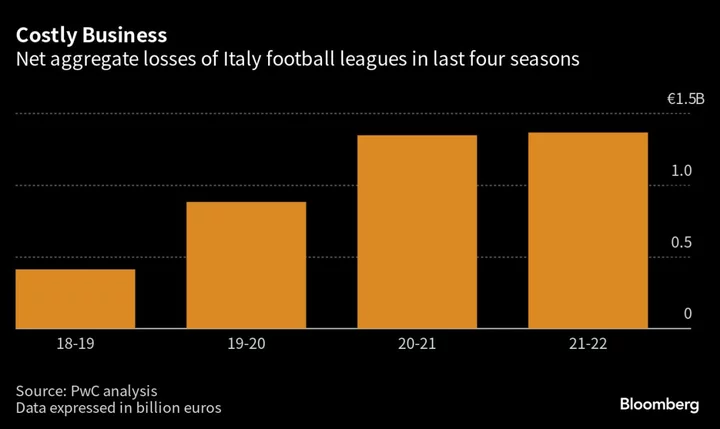
Italy Football Clubs Post €1.4 Billion Loss Despite Buyer Spree
Italian football clubs recorded the worst cumulative loss in fifteen years — even after international investors injected millions
2023-08-04 19:19
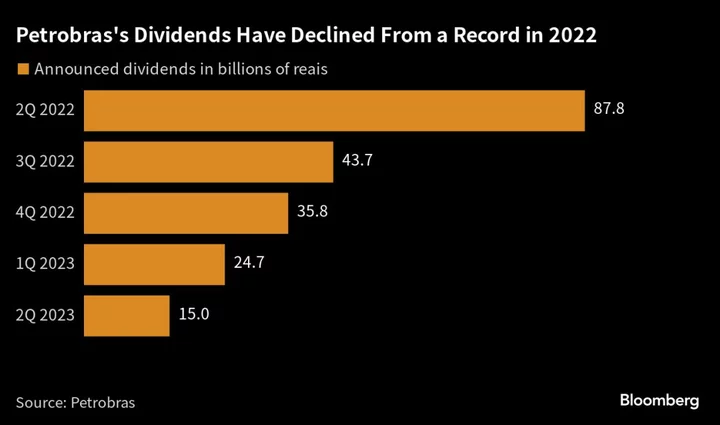
Petrobras Slashes Contentious Dividends and Buys Back Shares
Petroleo Brasileiro SA slashed politically contentious dividends after profits declined and the Brazilian oil major set a more
2023-08-04 18:54
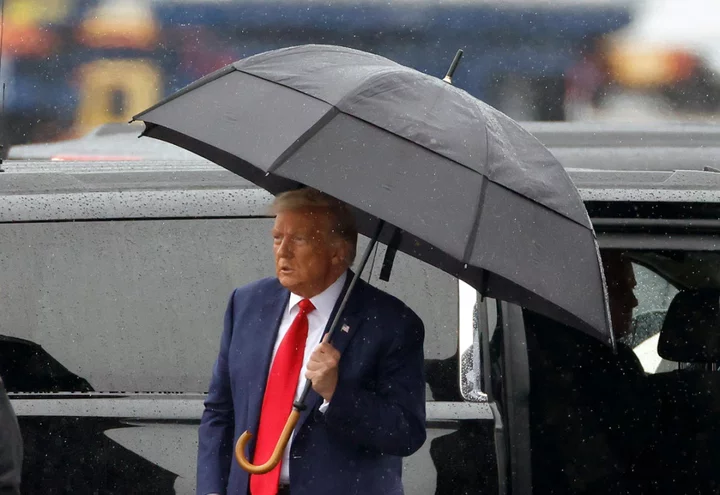
Trump angrily rails against ‘filth’ in Washington DC after arraignment on 2020 election conspiracy charges
Before departing from Washington DC after being arraigned on four federal charges, former president Donald Trump gave quick remarks in which he claimed the capitol had “filth”, “decay” and “broken buildings”. Mr Trump made a quick appearance at the nation’s capital on Thursday so he could appear in federal court to be formally charged with four counts related to his alleged efforts to overturn the 2020 election and subsequent January 6 attack on the Capitol. “This is a very sad day for America,” Mr Trump told reporters before departing on his private plane to New Jersey. The ex-president has continuously claimed he is innocent and that the indictment, brought forth by Special Counsel Jack Smith’s investigation, is a politically-motivated action. But unlike his previous post-arraignment speeches, Mr Trump chose to direct most of his statement toward Washington DC’s environment. “It was also very sad driving through Washington DC and seeing the filth and the decay and all of the broken buildings and walls and the graffiti,” Mr Trump said. “This is not the place that I left. It’s a very sad thing to see it.” Mr Trump spent approximately two hours in Washington DC, most of which was spent inside the E Barrett Prettyman Federal Courthouse. The ex-president pleaded not guilty to the four counts he was indicted on; conspiracy to defraud the United States, conspiracy to obstruct an official proceeding, conspiracy against rights and obstruction of, and attempt to obstruct, an official proceeding. The charges stem from Mr Smith’s probe into Mr Trump’s rhetoric in the days leading up to the January 6th attack on the Capitol, including Mr Trump’s false claims of election fraud. The most recent indictment alleges that Mr Trump knowingly spread lies that there was election fraud in 2020 and he actually won. “These claims were false, and the Defendant knew that they were false. But the Defendant repeated and widely disseminated them anyway – to make his knowingly false claims appear more legitimate, crate an intense national atmosphere of mistrust and anger, and erode public faith in the administration of the election,” the indictment reads. Despite the serious allegations, Mr Trump’s post-arraignment speech made little mention of the implications he is facing. “When you look at what’s happening this is a persecution of a political opponent. This was never supposed to happen in America. This is the persecution of the person that’s leading by very, very substantial numbers in the Republican primary and leading Biden by a lot so if you can’t beat them you persecute them or prosecute ‘em,” Mr Trump said before departing on his plane. Read More Live updates: Trump pleads not guilty at arraignment in 2020 election case What is an arraignment? Here’s what to expect following Trump’s indictment Trump pleads not guilty to federal conspiracy charges in plot to overturn 2020 election Trump rails against ‘filth’ in DC after arraignment on election conspiracy charges Trump ‘irked’ that arraignment judge didn’t call him ‘Mr President’ Former Trump spokesperson sheds light on Melania’s absence from his arraignment
2023-08-04 17:51
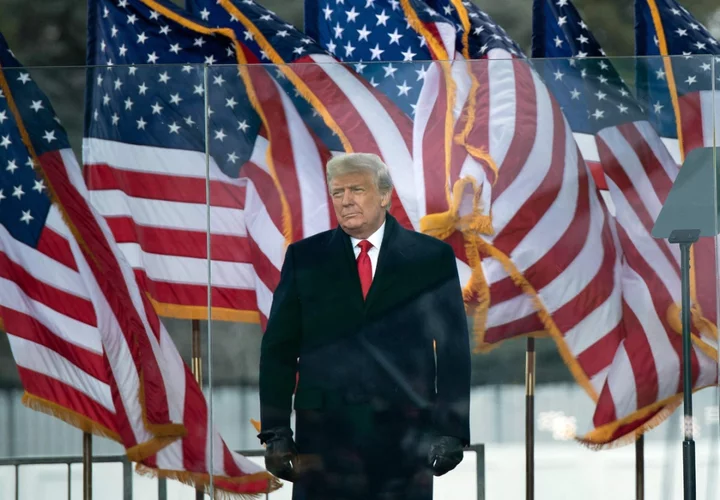
Donald Trump’s latest indictment is a test for America
The latest case of United States of America v Donald J Trump strikes at the heart of a question that has clouded the former president’s time in and out of office: Can he unequivocally lie and use that deceit to influence the outcome of a democratic election, against the will of millions of Americans? An indictment against the former president for his very public plot to overturn the 2020 presidential election is remarkable in that it is not only his third criminal indictment within four months, a historic precedent for this or any former or current president in US history. It also chronicles the alleged actions of a sitting president on his way out to bring American democracy down with him. Mr Trump already is criminally charged in New York City in a case connected to hush money payments to silence stories of his alleged affairs in the lead up to his 2016 election. The US Department of Justice also has charged him with his alleged retention of classified documents after leaving the White House. But the indictment unsealed on 1 August outlines a graver threat. Michael Waldman, president of the Brennan Center for Justice at NYU Law, said the charges “matter beyond the fact that a former president is accused”. “Donald Trump and his co-conspirators tried to overthrow American democracy. They wanted to negate the votes of millions of Americans. They did this using phony claims of voter fraud and rigged elections. These conspiracy theories are still being used to justify changes to voting and election law all over the country. Donald Trump will stand trial,” he said in a statement to The Independent. “The Big Lie will be on trial too.” The indictment outlines the familiar contours of a conspiracy-driven scheme and the violence that followed it, a narrative that members of Congress investigated for more than a year before publishing an 845-page report detailing Mr Trump’s refusal to cede power, regardless of the outcome. That report and countless investigations into the events surrounding January 6 have painted the attack on the Capitol as part of a much-larger effort to preserve a fragile American democracy. Unlike the other indictments against him, the latest charges amount to accusations of crimes committed by a man who president when he allegedly committed them. For months leading up to the 2020 presidential election, then-President Trump routinely and publicly undermined the legitimacy of an election that hadn’t even happened yet, sowing doubt about whether Americans’ votes would be counted at all. But as the indictment alleges in a detailed, chronological accounting of the scheme, the former president was routinely made aware that his statements were false – by two attorneys general, Justice Department officials, an election security chief, his vice president, his campaign, and Republican governors and election officials who voted for and endorsed him. According to the indictment, one senior adviser said the campaign’s legal team “can’t back any” of the former president’s claims. “I’ll obviously hustle to help on all fronts, but it’s tough to own any of this when it’s all just conspiracy s*** beamed down from the mothership,” the adviser wrote, according to prosecutors. Federal prosecutors outlined what, allegedly, happened next, when it became clear Mr Trump was losing: Then-President Trump and his allies conspired with officials in states that he lost to invalidate ballots and use fraudulent electors to cast their electoral college votes on his behalf, relied on the Justice Department to force the plan through, and pressured his vice president to go along with it, before exploiting the violent disruption in the halls of Congress to make another last-ditch attempt to reject the outcome. “It was an attempt to usurp from the people our right to choose our own leaders, our own president, through the electoral college system,” according to Democratic US Rep Jamie Raskin, who served as the lead impeachment manager for Mr Trump’s second impeachment for the events surrounding January 6. “They’re very grave and serious charges, of course, but extremely well anchored in the facts,” he told MSNBC. The resulting four-count indictment accuses the former president of committing three criminal conspiracies while he was still in office. Mr Trump is accused of a conspiracy of “dishonesty, fraud, and deceit” to “impair, obstruct, and defeat” the process of collecting and certifying votes in the states, a conspiracy to obstruct the certification of those votes in Congress, and a conspiracy to deprive the right to vote and have one’s vote counted, a violation of long-standing civil rights law first enacted in the violent aftermath of the Civil War. The indictment also lists six unnamed co-conspirators who are likely to include Trump-connected attorneys and government officials. Mr Trump relied on his “prolific” lies to help organize fake electors in several states to submit false vote certificates to Congress, positioning Mike Pence to oversee a fraudulent certification of those bogus slates of electors on 6 January, 2021, the indictment alleges. The former president also allegedly leveraged the Justice Department to advance the scheme; at one point in the indictment, prosecutors suggest that the Trump administration was willing to deploy the military to crush opposition to his election, if he were to successfully overturn Mr Biden’svictory. Three days before January 6, a co-conspirator believed to be Justice Department official Jeffrey Clark spoke with a deputy White House counsel who had previously warned Mr Trump that “there is no world, there is no option, in which you do not leave the White House”. “Well,” Mr Clark allegedly replied, “that’s why there’s an Insurrection Act.” Following the hours-long siege at the Capitol on January 6, a violent show of force fuelled by Mr Trump’s baseless narrative, his aides and co-conspirators exploited that chaotic delay to pressure Congress to refuse the results for a final time. “We are talking about democracy on the brink, as you read through this indictment,” Alyssa Farah Griffin, a former White House communications director under then-President Trump, told CNN. “It shows how close we got.” The charges are unprecedented in their scope, but the tools to prosecute election interference and voter fraud conspiracies that have deprived Americans’ rights have been in place for more than a century. “Our democracy and our legal system are actually prepared to deal with these kinds of unprecedented situations,” Sean Morales-Doyle, director of the Brennan Center’s voting rights and elections programme, told The Independent. “I think the history is important, because we’re also not at the end of history here.” While he ultimately failed in his efforts, Mr Trump’s narrative of victimisation and “stolen” elections has infected a wide swath of the American public, particularly Republican officials and their supporters. Mr Trump’s rhetoric has persuaded roughly three in 10 Americans to believe the lie that the election was stolen from him. His false and inflated claims, spanning more than a decade, have sowed enough doubt among his supporters to construct the lie of “stolen” and “rigged” elections, animating Republican attempts to challenge results and craft dozens of pieces of legislation to do what Mr Trump failed to do in court and while in office. Since leaving office, the former president has continued a narrative of political persecution as he seeks the 2024 Republican nomination for president, with a reliable mention of “stolen” or “rigged” election in his fundraising messages, on his Truth Social, and on the stages of political conferences and campaign rallies. Mr Trump, who has frequently used projection to accuse his rivals of doing the very things of which he has been accused, now refers to the multiple investigations and indictments against him as politically motivated “election interference” – a charge at the center of his latest indictment. He accuses his rival of “weaponising” the federal government against him – once again, what prosecutors have alleged Mr Trump did to stop Mr Biden from winning the 2020 election. Mr Trump and his defenders argue that the real crime is the unrelated case involving Hunter Biden, and what they allege is a Justice Department coverup to protect him, while they ignore the Trump family history of alleged fraud, self-dealing and enrichment at the public’s expense. Fox News has spent considerable airtime suggesting that the indictments are timed to distract from spurious Republican-led investigations into the president’s son, casting Mr Trump as a victim of his politically motivated rival. The network – less than four months after its historic $787m settlement to avert a potentially devastating defamation trial involving many of the same lies at the center of Mr Trump’s push to overturn election results – immediately got to work to defend the former president as news of the indictment broke. Jesse Watters, who inherited Tucker Carlson’s prime-time slot after he was fired from the network, called the indictment “political war crimes”. Right-wing media pundits claim he was merely acting within his authority to challenge the outcome of the results, or simply using his First Amendment protected rights to reject them, or that he truly believed, despite overwhelming evidence, that the election was stolen from him. “I would like them to try to prove beyond a reasonable doubt that Donald Trump believed that these allegations were false,” lead Trump lawyer John Lauro said on Fox News the night of his indictment. The indictment makes clear that Mr Trump has the right – “like every American” – to say whatever he wants about the election, even to falsely claim that he won. But what he cannot do, prosecutors argue, is weaponize those lies in a conspiracy to overturn the results. “They’re not attacking his First Amendment right,” former US Attorney General Bill Barr told CNN. “He can say whatever he wants. He can even lie. He can even tell people that the election was stolen when he knew better. But that does not protect you from entering into a conspiracy. All conspiracies involve speech, and all fraud involves speech. So, free speech doesn’t give you the right to engage in a fraudulent conspiracy.” With each indictment, the former president has fanned the flames of outrage and suggested that the US faces World War III and imminent violence without his leadership. With news of criminal charges in New York City in March, he demanded widespread protests and called America a “dying” and “third world” country where “leftist thugs” are “killing and burning with no retribution”. “There’s no other way to say it: our nation is teetering on the brink of tyranny,” a campaign fundraising message announced after news of his latest federal charges. On his Truth Social, he compared the current administration to “Nazi Germany in the 1930s, the former Soviet Union, and other authoritarian, dictatorial regimes”. Mr Trump remains the frontrunner for the Republican Party’s nominee in the 2024 presidential race, and by all measures it appears he would not do anything different should he return to the White House. His 2024 campaign agenda builds from his dark vision of American “carnage” from his first moments as president and the four chaotic years that followed. In recent months, he has demanded the executions of drug offenders and human traffickers, considered the “termination” of the US Constitution, pledged national restrictions on abortions and gender-affirming care for trans people, and promised political vengeance and “retribution” for his supporters, offering himself up as a martyr for a movement he inspired. “I’m being indicted for you,” he tells them. Federal prosecutors have already charged more than 1,000 people in connection with the attack on the Capitol on 6 January, 2021. Donald Trump is now one of them. “January 6 and the effort to overturn the 2020 presidential election, together with the first criminal trials of an American president, will now become singularly infamous events in American history,” conservative former federal judge J Michael Luttig said. “These events will forever scar and stain the United States. And they will forever scar and stain the United States in the eyes of the world.” Read More Trump indictment – live: Trump posts ominous video as court arraignment nears for 2020 election charges Eight key revelations from Trump’s January 6 indictment Trump’s election fraud claims were always bogus. Will his history of lies finally catch up to him? Why Trump is charged under a civil rights law used to prosecute KKK terror Trump supporters see latest indictment as proof of a conspiracy to take him down Trump, January 6 and a conspiracy to overturn the 2020 election: The federal investigation, explained Who is Jack Smith? The special prosecutor who just indicted Trump again
2023-08-04 17:45
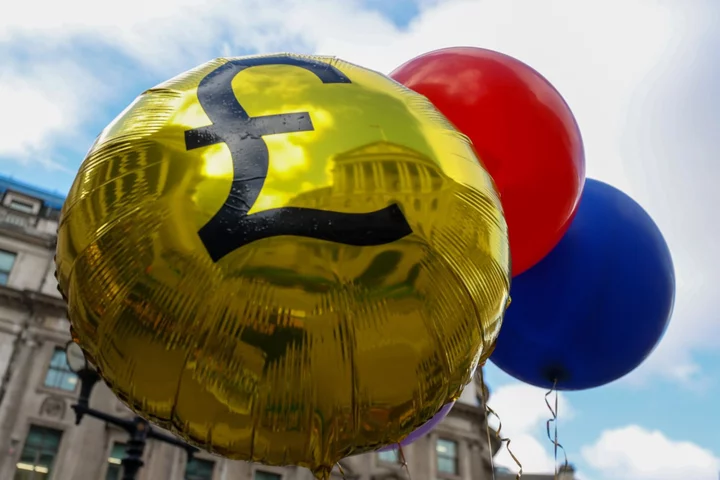
UK Rate Hikes Hurting Business and May Be Near Peak, IOD Says
The Bank of England’s longest series of interest rate increases in three decades is starting to hurt businesses,
2023-08-04 17:27
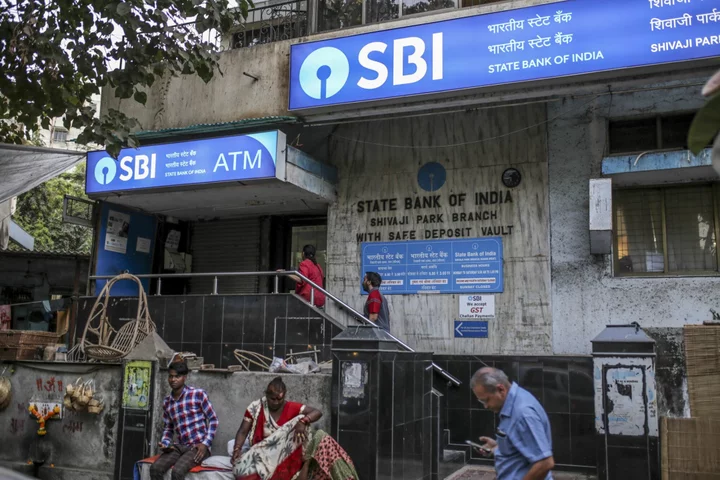
State Bank of India Shares Fall As More Loans Turn Sour
State Bank of India saw a metric tracking loans that turn bad rise, prompting shares of the nation’s
2023-08-04 17:22
